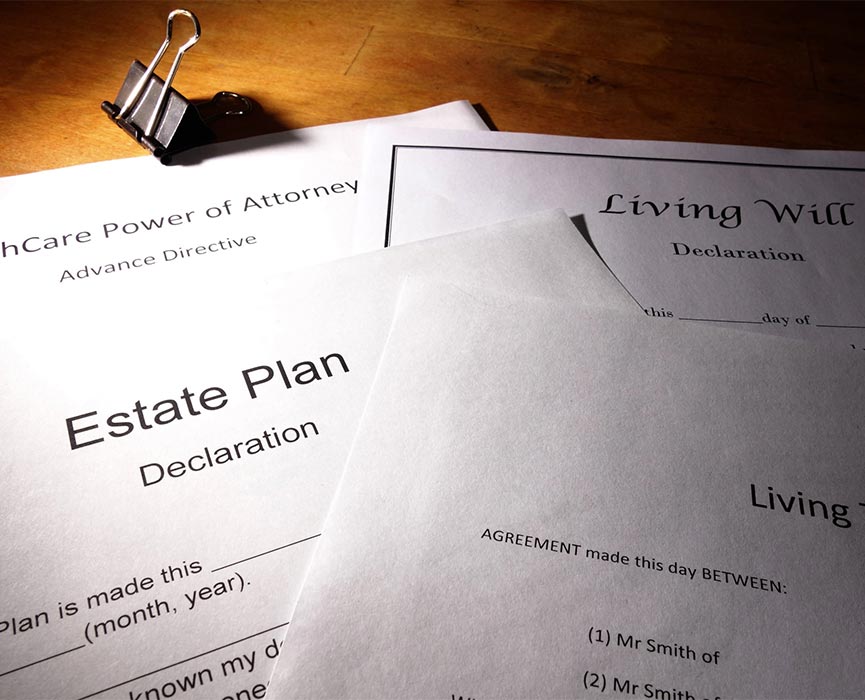The first step to filing for divorce is to file a Petition for Dissolution of Marriage with your local court. There will be a small court filing fee. The papers are served to your spouse, and they are given 20-30 days to respond. Your next steps will depend on what their response is, or if they even do respond to the petition. Having an attorney on your side will ensure the proper steps are taken to ensure an efficient process.
Why do I need to plan my estate?
Most people who have property to pass on wish to choose exactly who gets what, and that they pay as few taxes on it as possible. Therefore, a clearly planned estate can also help ensure that your assets aren’t tied up in the probate process. Contact our Phoenix Estate Planning Lawyers for assistance.
Why Wills in Arizona are Important?
No matter how much you have accumulated during your lifetime, you are the only person that should decide how they are distributed upon your death. Dying WITHOUT A WILL is know as dying intestate. Thus, your estate will be disbursed at the discretion of the probate court under Arizona laws. The probate court will also make decisions regarding the distribution of community property in your estate. Thus, it is important to have a will. Having a Will in Arizona will assure that your wishes are carried out.
What is included in my estate?
When you pass away, all the real and personal property you own at that time is your estate. Real properties include houses, cabins, and other land-based assets. Personal property includes vehicles, jewelry, furniture, etc. An experienced attorney for estate planning can be of great assistance.
Am I required to have a will?
There is no legal requirement that you have a will, but things can be far more complicated if you don’t have one when you pass away. You can use a will to state how you wish issues, more than just the distribution of your assets, to be resolved. Additionally, you can use your will to designate an executor for your estate. Furthermore, you can also assign who will care for your children should you pass away while they are minors. Your Arizona Lawyers for estate planning can assist you with a will.
Can I change or cancel my will?
In general, there are three ways to cancel or revoke a will. First, you can destroy the original will. Second, you can make a new valid will. Third, you can make a valid amendment to your original will.
In Arizona, to change your will, you will need to make a codicil, or a legal addition to your will. Therefore, you should consult with your experienced estate attorney before revoking your will or making a codicil. Consulting with an experienced estate attorney reduces any challenger’s chance of success in future disputes of your will.
What happens if I die intestate?
Passing away “intestate” is another way of saying someone died without a will. Every state has its own intestacy laws that determine how a person’s assets will be distributed if they pass away without a will. For example, in some states, a decedent’s spouse will receive everything when they pass away, while other states may give the spouse half-and-half to the decedent’s children. But not everyone has a spouse and children- in most states, parents will be the next in line to inherit the estate. If the decedent’s parents are no longer alive, their siblings will typically be next in line. If none of the above are available, the state will need to look further back into the decedent’s family tree.
Probate is the name for all the steps your estate’s executor must complete after your death. If you haven’t named an executor, court assignment of an executor to your estate will be the first necessary task. The executor will need to confirm that the will is valid, identify heirs, and calculate the decedent’s total assets and debts. This process can be completed quite quickly when the decedent has less assets and beneficiaries. But in more complex circumstances, this process can take a year or even longer to complete.
Sometimes, assets will need to be sold to facilitate the process of distributing the estate. This can draw the process out even longer. Probate can also be highly expensive, especially if the executor needs to hire an attorney for assistance with the process. Another issue is that probate is a public proceeding, and anyone can go look up the documents associated with a probate case. There may be information in these documents that the beneficiaries don’t want to be public knowledge. Often, robbers often scour these documents for information about homes that are uninhabited and easy targets.
A living will, also known as an advanced healthcare directive, states how you would like certain medical issues to be addressed, while you are still alive, if you are unable to articulate your wishes yourself. For example, if you are in a coma, you may not be able to give informed consent to certain procedures. Also, you may not wish to be kept on life support. A living will assists with situation such as these.
People of all ages should consider getting a living will in case they experience an unexpected medical emergency. Our Phoenix estate attorneys can help you create a living will. Call (480) 263-1699 for help today.
Can I make plans for my pets’ care after my passing?
If you wish to plan for your pets’ care after your death, you should designate a caregiver (and an alternate caregiver) for your pets. You should also leave care instructions, as well as money for care expenses, to that caregiver. If you can’t find a friend or relative to care for your pets in the event of your death, you can also designate a non-profit rescue organization in your will. This can also be achieved through a trust, but is unnecessarily complex and expensive for the average person.
A trust is similar to a will, but can be used during your lifetime. The assets you wish to bequeath will be placed in a trust for a specified beneficiary, and transferred to them upon your death. While you are still alive, the legal title to the asset will be in the trust. A third party known as a trustee will be appointed to the trust to manage the asset and make sure it is transferred as intended upon your death. One of the benefits of using a trust is that the trustee may help you (and your beneficiaries) increase the asset’s value before your passing. Another benefit is that there is no probate process if you distribute your property through a trust. This keeps the process, and any sensitive documents related to your property, private.
A guardianship is used for people who can no longer care for themselves, or are susceptible to fraud and undue influence. A guardian will be assigned to make legal decisions for the individual in question. The guardian will need to make decisions about the individual’s medical treatments, living conditions, financial affairs, and end of life care. The court uses a high standard of proof when deciding whether to appoint a guardian, and who that guardian should be.
Do my beneficiaries have to pay taxes on their inheritance?
Once the entire estate has been assessed, the executor will calculate how much of the estate is taxable. The three types of taxes to be paid are gift taxes, estate taxes, and generation-skipping transfer taxes. The executor can apply tax deductions, like for probate claims, funeral expenses, charitable contributions, and more. Estate tax laws vary by state, so check with your attorney so you can be sure which taxes will apply to your estate.
Can I leave some or all of my estate to a charity?
You can list a charitable organization as a beneficiary in your will, but you should keep in mind that it may be subject to different taxation rates. In some states, this could be as high as 50 percent. This also opens up the risk of a relative disputing the terms of the will or trust.
What is a power of attorney in Arizona?
This is a legal procedure that gives someone the right (and responsibility) to act as an individual’s attorney should they become incapacitated or otherwise unable to make their own legal decisions. In essence, this document allows someone to designate who they would want to be their legal guardian if it becomes necessary. A power of attorney can be limited in scope, such as only medical or financial decisions, or can encompass every aspect of the individual’s life.
Do I need an Arizona estate attorney to plan my estate?
If you have a modest lifestyle, you might be able to get by with court forms when drafting your will. But if you have significant assets, or family members that are known to be vindictive, you may want to consider drafting a more iron-clad will or trust with the assistance of an experienced attorney. For a free consultation with one of our dedicated estate planning lawyers, call or use our online form to get started today.





